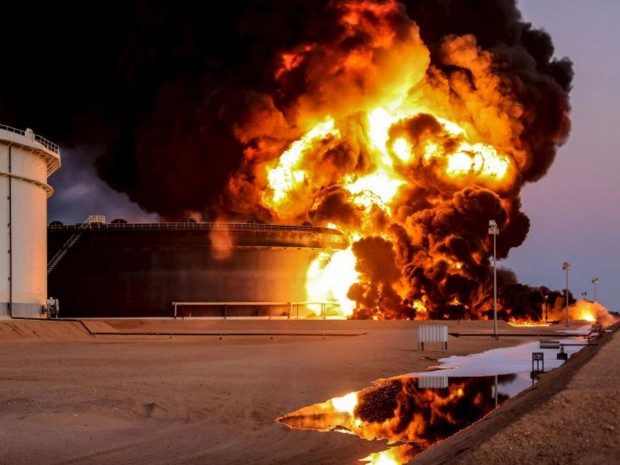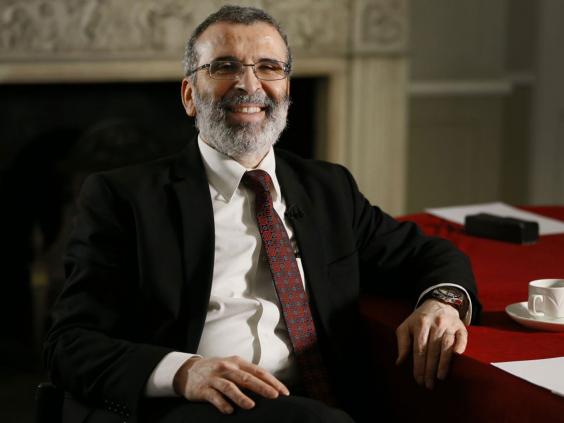Oil facilities guards suspected of siphoning Libya’s oil supplies

The Independent
An armed force set up to protect Libya’s oil assets – the only effective source of income for the failing state – has been accused of siphoning off supplies and then abandoning facilities to advancing Isis fighters, actions that have resulted in more than $60 billion revenue being lost.
The Petroleum Facilities Guard (PFG), a group about 27,000-strong meant to be bipartisan in a country with two rival governments, has become the “biggest obstacle to raising money from the industry and a hindrance to forming a unified government”, according to the head of Libya’s National Oil Corporation (Noc).
The PFG has become a “private army” for its head, Ibrahim Jadran, according to Mustafa Sanalla, chairman of Noc, which is based in Tripoli. “They have tried to sell oil themselves and then they failed to protect the places they were meant to,” he told The Independent.
“We estimate that the activities of the PFG has adversely affected 70 per cent of oil production,” he said. “We are an autonomous body serving Libya rather than either of the governments. The PFG are also meant to be like that, but their only loyalty is to making money.”
The PFG has gained control of the oil ports and complexes in Ras Lanuf, Sidra and Zueitina in eastern Libya. In March 2014 Mr Jadran announced that he had given himself greater autonomy and sent the tanker MV Morning Glory, flying North Korean colours, loaded with 234,000 barrels of crude oil for sale abroad.
The incident led to the collapse of the government in Tobruk of Prime Minister Ali Zeidan, who fled the country. The ship was seized by US Navy Seals on the orders of the Obama administration.
Mr Jadran, a former member of the Libyan Islamist Fighting Group, which took arms against the Gaddafi regime, has spoken out against the Tripoli government and stressed his opposition to Isis. “I am the leader of a security force like the police,” he said recently. “The previous [Tripoli] government tried to give me a big bribe, I totally refused and demanded an investigation into the exporting of oil since the revolution and this is the real cause of dispute between me and the previous government.”
He added: “We reject claims by some people that we are continuing to smuggle oil, we haven’t exported any oil since Morning Glory.”

With Isis fanning out from its base in Muammar Gaddafi’s hometown, Sirte, and heading for the oil facilities, Mr Sanalla said he sent a tanker to drain the storage facilities in Ras Lanuf. But Mr Jadran refused permission for this to take place. Isis fighters attacked the port and the oil was set alight. “We could have saved the oil, but the PFG sabotaged this,” said Mr Sanalla. “Then they failed to put up resistance and Isis were able to carry out their attack and destroy the fuel.”
“There weren’t that many Isis fighters taking part in the attack, so we don’t know why PFG just went away,” he added. “They had failed to protect other facilities as well and these have been looted. The infrastructure is being badly damaged.”
Fighting involving the two rival governments, in Tripoli and Tobruk, and competing militias has led to chaotic conditions in Libya. At the same time, a 75 per cent fall in world oil prices has meant that the value of exports has fallen drastically. The International Monetary Fund has pointed out that the fiscal deficit last year of 54 per cent of gross domestic product was one of the highest in the world.
Mr Sanalla said: “Isis are not occupying the oil facilities; they are damaging them and they are doing this with a small number of people. They want to prevent the country unifying under one government and we need the unity to save the economy, which is in a bad way. The PFG too is a hindrance to unity; it needs to be disbanded or integrated into a future army. Without a single government there will be no security and Libya will decline further into lawlessness and chaos.”
But, despite prolonged negotiations under UN auspices, forming a unity government for Libya is proving problematic. The Tobruk government parliament has voted overwhelmingly to reject a proposed caretaker administration because of its supposed militia influence. However it offered the negotiating council 10 days to present new proposals.
How to submit an Op-Ed: Libyan Express accepts opinion articles on a wide range of topics. Submissions may be sent to oped@libyanexpress.com. Please include ‘Op-Ed’ in the subject line.
- Libya’s HCS invites applicants for key state roles - December 31, 2023
- UK calls on Iran to prevent escalation in Israel-Hamas conflict - November 05, 2023
- Libyan Interior Minister: Immigrant shelter costs a fortune - November 05, 2023


